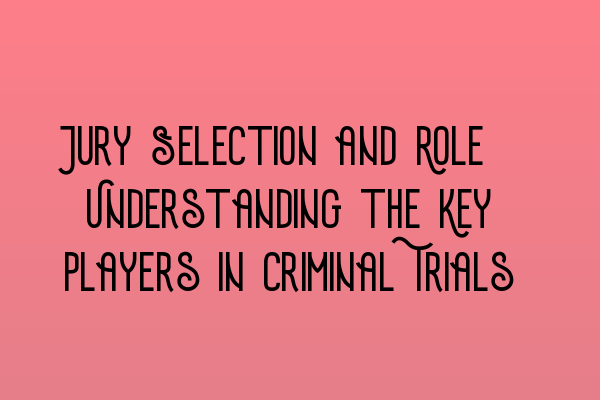Jury Selection and Role: Understanding the Key Players in Criminal Trials
When it comes to criminal trials, one of the most crucial aspects is the selection of the jury. The jury plays a vital role in the administration of justice, as they are responsible for determining the guilt or innocence of the defendant based on the evidence presented. In this article, we will explore the process of jury selection and the key players involved. If you are preparing for the SQE (Solicitors Qualifying Examination), make sure to check out our related articles on SQE 1 Practice Exam Questions, SQE 1 Practice Mocks FLK1 FLK2, SQE 2 Preparation Courses, and SQE 1 Preparation Courses. Stay updated with the SRA SQE Exam Dates as well.
The Role of the Jury in Criminal Trials
The jury is a group of individuals selected from the community who are unbiased and impartial. Their role is to listen to the evidence presented by both the prosecution and the defense, and based on that evidence, reach a verdict. It is important to note that the jury’s decision must be unanimous in criminal trials.
The Jury Selection Process
The jury selection process, also known as voir dire, involves questioning potential jurors to determine their suitability for serving on the jury. The process aims to select jurors who are unbiased, impartial, and capable of reaching a fair verdict.
The Key Players in Jury Selection
1. The Judge: The judge presides over the trial and is responsible for ensuring the fairness of the proceedings. In the jury selection process, the judge may ask potential jurors general questions to assess their qualifications.
2. The Prosecution: The prosecution, represented by the Crown Prosecution Service (CPS), presents the case against the defendant. They may ask potential jurors specific questions to assess their biases and ensure a fair trial.
3. The Defense: The defense, represented by the defendant’s solicitor and barrister, presents the case for the defendant. They also have the opportunity to question potential jurors to identify any biases that may affect their client’s case.
4. The Defendant: The defendant, accompanied by their legal representatives, may have the right to be present during the jury selection process. However, they typically do not participate directly in the questioning.
5. The Clerk of the Court: The clerk of the court assists with administrative matters during the trial, including managing the jury selection process. They may help compile the jury panel from which potential jurors are selected.
Factors Considered During Jury Selection
During jury selection, potential jurors may be assessed based on various factors, including:
- Prior knowledge of the case
- Personal experiences or biases that may affect their judgment
- Connections to the parties involved or the legal system
- Ability to understand and follow the evidence and legal instructions
The goal is to ensure that the jury consists of individuals who can determine the case solely on the evidence presented in court and not be unduly influenced by external factors.
Conclusion
The jury selection process is of utmost importance in criminal trials. It ensures that the defendant receives a fair trial and that justice is served. Understanding the key players involved in jury selection and the factors considered can provide valuable insights into the administration of justice. If you are preparing for the SQE, don’t forget to check out our related articles on SQE 1 Practice Exam Questions, SQE 1 Practice Mocks FLK1 FLK2, SQE 2 Preparation Courses, and SQE 1 Preparation Courses. Stay informed about the SRA SQE Exam Dates as well.
